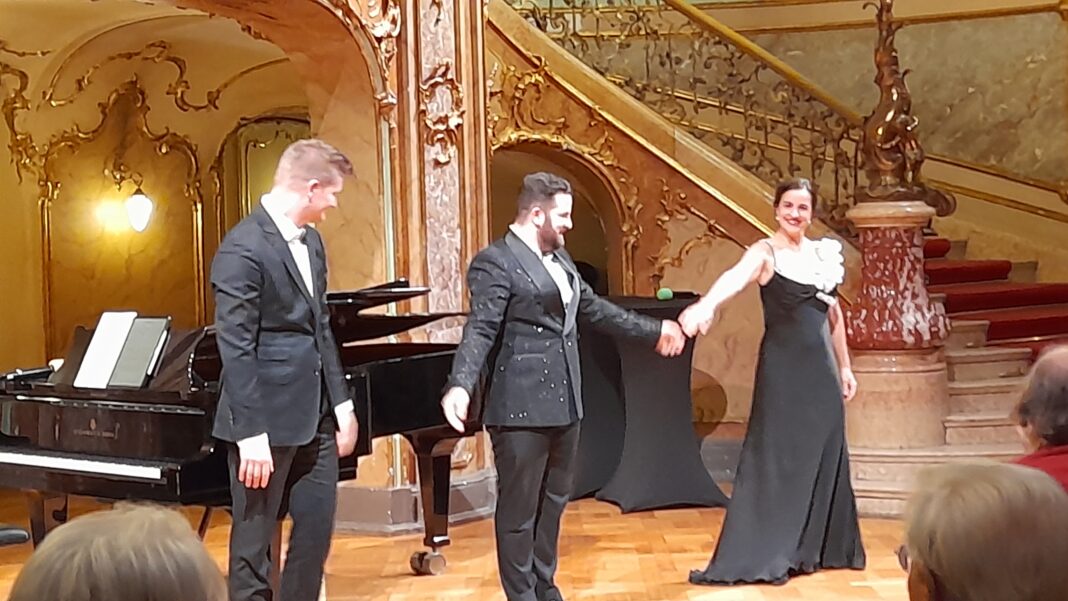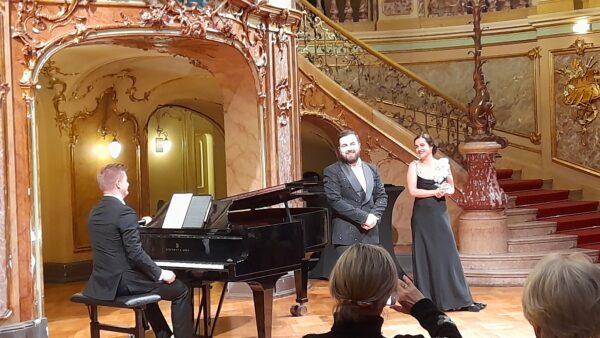
From left, Adam Rogala, Hovhannes Karapetyan, and Silvia Hauer
Wiesbaden State Theater Welcomes Armenian Vocalist
by Muriel Mirak-Weissbach
the Armenian Mirror Spectator
WIESBADEN, Germany , NOVEMBER 27, 2024 – Silvia Hauer, a German mezzo soprano who has been a member of the Wiesbaden Staatstheater ensemble since 2015, welcomed Hovhannes Karapetyan, an Armenian bass-baritone who joined the ensemble this year, to sing solos as well as duets, accompanied by pianist Adam Rogala, who was born in Łódź, Poland. Rogala has been solo-repetiteur in Wiesbaden since 2023, and performs as accompanist as well as soloist.
From their opening duet, Labor Lost, from the “The Boy’s Magic Horn” by Gustav Mahler (1860-1911), it was clear that newcomer Karapetyan is also a performer accustomed to the opera stage. Hauer followed with two solo Mahler works set to texts by poet Friedrich Rückert, If You Love for Beauty and I Am Lost to the World. Rückert, who had mastered 40 languages, translated poetry from many foreign tongues and was a beloved poet in the 19th century.
The musicians not only sang, but used the intervals to share their experiences and insights with the audience. Why choose Mahler was one question raised, for example. Hauer replied that hearing Mahler moves something deep within her; like the symphonies, the songs too evoke images of landscapes. Karapetyan, who sang three Michelangelo songs by Hugo Wolf (1860-1903), revealed that this was the first time he had sung German songs to a German audience, which constituted an artistic challenge. His delivery, the audience acknowledged with applause, was impressive. He added that the pieces, It is quite often that I think of my past life, Everything ends which comes to be, and Is my soul feeling the longed-for light? had a personal impact on him, in that they prompted reflection on the process of becoming older.
Music from one’s own cultural tradition has a special quality. Pianist Rogala, who performed Nocturne (op. 16, Nr. 4 B major) by Ignacy Jan Paderewski (1860-1941) and Military Polonaise (op. 40, Nr. 1 A major) by Frédéric Chopin (1810-1849), pointed out that Paderewski had been not only a composer but also a politician, having served as prime minister and foreign minister. The piece by Chopin was especially appropriate, since the concert was taking place on Polish Independence Day, November 11.

From left, Adam Rogala, Hovhannes Karapetyan and Silvia Hauer
Karapetyan, endowed with a powerful, resonant voice, delivered a controlled and nuanced rendition of Tsirani tsar (Apricot Tree) by Komitas (1869-1935), which was moving. He spoke then of how important music, especially the music of Komitas, is for him during this, his first year away from Armenia; it is what keeps him close to his homeland. He told the audience how Komitas, a “hero,” had travelled from village to village, collecting and writing down traditional local melodies, including lullabies. Apricots, the subject of this song, are very special in Armenia, he said; not only are the colors of the national flag red, blue, and “apricot,” but the musical instrument Duduk is made from the wood of the apricot tree; not to mention, that Armenian apricots are delicious, he added. Silvia Hauer said that though she lives and works in her native land, on her frequent travels to perform abroad, she too experiences the same need for music and visited the opera every night when in Vienna.